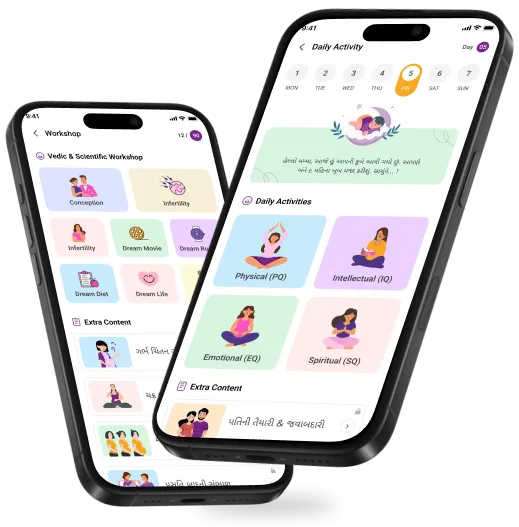Hey there, beautiful moms and mom-to-be!
Today, let’s explore the wonderful world of pregnancy. And let me tell you, it is filled with unexpected twists, turns, and a whole lot of love.
Imagine this: You're expecting a baby, and you want to make sure everything is going smoothly. You've heard about genetic tests during pregnancy, but you're not sure what they are or if they're right for you. Don't worry; we're here to guide you about genetic testing in the simplest way possible!
Genetic tests during pregnancy are like a sneak peek into your baby's genetic makeup. It's like looking at a tiny roadmap of their future health. These tests can help detect any potential genetic conditions or abnormalities early on, giving you time to prepare and plan for the best possible care for your little one.
But what exactly are genetic tests, and why are they important during pregnancy? Let's break it down.
What is Genetic Disease?
There are many diseases which the child acquires through the genes of his parents even before he is born. These diseases are called genetic diseases or genetic disorders.
There are hundreds of dangerous diseases like Diabetes, Cancer, Heart Attack, Thalassemia, Sickle Cell, Obesity, Blood, Brain and Eye diseases, Epilepsy etc., which if a person has them, then the chances of having it in the next generation increases. She goes.
Every 5 seconds a child under the age of 15 takes his last breath in the world and More than half of these deaths are caused by genetic diseases.
What are Genetic Tests?

Genetic tests are like detectives searching for clues in your DNA. They look for changes or variations in your genes that could indicate a risk of certain conditions or diseases. During pregnancy, these tests can give you valuable information about your baby's health even before they're born.
Genetic tests are done for planning parents that are genetic tests before pregnancy or after conceive. Blood sample is taken for this test. If there is any suspicion in the blood sample, then some part of body tissue or saliva or amniotic fluid or placenta is also taken for confirmation.
If possible, every woman should get this test done before or during pregnancy, so that she can know before the birth of the child, which genetic diseases her child may have. And on the basis of this, some decisions can be taken in advance or prior preparations can be made.
When is a Genetic Test necessary?
Genetic testing is necessary in cases where:
- One partner has a genetic (hereditary) disease
- There is a family history of genetic diseases
- Something bad happened to the mother during pregnancy
- The woman has had more than 2 missed pregnancies
- Some congenital anomalies have been found in the previous children of the woman or her family
Apart from this, a genetic test is also necessary for those women who conceive late (usually after 34 years) or have any disease that is likely to be linked to genes.
{{cool-component}}
Genetic Test Tips
If you get this test done with planning, it is better. If only one of the mother and father has bad genes, then the child will not have that disease. Even if both have bad genes, the child has only a 25% chance of having the disease. Although genetic testing may increase your anxiety, it is wise to know in advance whatever the problem may be, so that the right decision can be taken at the right time.
Types of Genetic Tests
What are 3 types of genetic tests for diseases, lets know how are genetic tests done:
- Screening Tests: These tests look for common genetic conditions, like Down syndrome, genetic test for autism by analyzing a small sample of your blood or sometimes a cheek swab. They're like a quick check-up to see if everything is on track.
- Diagnostic Tests: If a screening test shows a potential issue, diagnostic tests can provide more detailed information. These tests involve taking a sample of amniotic fluid or tissue from the placenta to get a closer look at your baby's genetic makeup.
- Carrier Screening: This type of test checks if you or your partner carry genetic mutations that could be passed on to your baby.
Common Prenatal Genetic Tests

Some of the most common list of genetic tests during pregnancy include:
- First Trimester Screening: This combines a blood test and an ultrasound to assess the risk of chromosomal abnormalities.
- Cell-Free DNA Testing: A simple blood test that analyzes fetal DNA in the mother's bloodstream, providing information about chromosomal conditions like Down syndrome.
- Amniocentesis: A diagnostic test where a sample of amniotic fluid is collected to examine the baby's chromosomes for any abnormalitie.
Genetic Tests in India
In India, genetic tests for pregnancy are becoming more accessible and affordable. With advancements in technology, expectant parents can now access a wide range of genetic tests to ensure the health and well-being of their baby.
Are Genetic Tests Accurate?
How accurate are genetic tests? Let’s know, Genetic tests are highly accurate, but like any medical test, there's always a small chance of error. However, advancements in technology have made these tests accurate, giving parents peace of mind about their baby's health.
{{cool-component-1}}
How Much do Genetic Tests Cost?
The cost of genetic tests can vary depending on the type of test and where you live. In India, genetic testing is becoming more affordable, making it accessible to more families. In India, this test is done for Rs 30 to Rs 50 thousand.
Conclusion

Imagine This: You're sitting in the doctor's office, anxiously waiting for the results of your genetic test. As the doctor enters the room, you hold your breath, hoping for good news. And then, the doctor smiles and tells you that everything looks perfect. You breathe a sigh of relief, knowing that you've taken an important step in ensuring your baby's health.
In conclusion, genetic tests during pregnancy offer valuable insights into your baby's health and can help you prepare for any challenges that may arise. With advancements in technology and accessibility, these tests are becoming an integral part of prenatal care, giving parents the knowledge and peace of mind, they need as they embark on this incredible journey of parenthood.
Disclaimer: This blog is correct as per the writer's knowledge. This is not medical guidance. Follow as you are responsible for.












.webp)

.webp)





